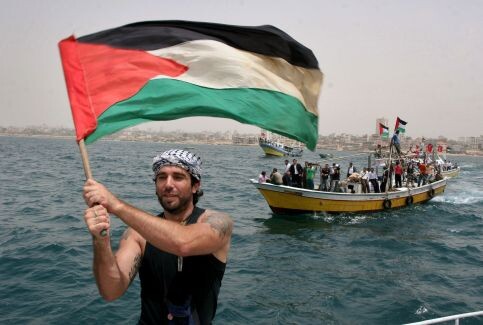The Electronic Intifada 15 April 2011

Vittorio Arrigoni in Gaza, June 2010. (Lu Yingxu/Newscom)
Palestinians and international solidarity activists around the world are collectively mourning the shocking death of Vittorio Arrigoni, an Italian journalist and solidarity activist. Arrigoni was also an occasional contributor to The Electronic Intifada (see “Gaza’s record-breaking children,” 16 August 2010 and “No words to console Gaza child after mother is killed by Israeli shelling,” 26 July 2010).
Arrigoni, 36, was found dead early this morning in Gaza City, hours after a video of him blindfolded and apparently beaten had surfaced on the Internet. In the video, his captors threaten to execute Arrigoni unless the Hamas government in Gaza released the little-known group’s imprisoned leader.
Arrigoni was the first foreign national known to be kidnapped in Gaza since Hamas began administering the territory four years ago. Previously, there had been a number of kidnappings of journalists, international aid workers and other visitors to Gaza, all eventually released. BBC reporter Alan Johnston was the most high-profile and longest-held captive, held for 114 days by the Dughmush clan, which some observers say have operated opportunistically and criminally under the guise of Islamic piety.
While the identities of Arrigoni’s kidnappers and those responsible for his death and the reasons why they killed him are murky, Arrigoni himself was well-known and admired by those with whom he worked in solidarity with the Palestinian people. He first arrived to Palestine in 2002, his mother, Egidia Beretta, told the Italian news agency ANSA (“Hamas says it found body of Italian activist,” The New York Times, 15 April 2011).
Arrigoni was involved with the International Solidarity Movement, and had last entered Gaza in 2009 during one of the efforts to break the siege on Gaza by boat. Arrigoni was among a handful of international activists present during Israel’s winter 2008-09 attacks on the Gaza Strip, volunteering with the Palestine Red Crescent Society’s emergency medical worker teams, despite the very dangerous conditions they faced. He was frequently interviewed by Italian media during the three weeks of bombardment, as Israel had banned journalists from entering the Gaza Strip. His daily dispatches during those three weeks, during which 1,400 Palestinians were killed, the vast majority civilians, were published in 2010 in a book titled Gaza: Stay Human, translated into English by Daniela Filippin and with an introduction by Israeli historian and dissident Ilan Pappe.
Arrigoni had been injured and arrested several times by the Israeli military. According to the International Solidarity Movement, Arrigoni was injured when the Israeli navy fired a water cannon at Palestinian fishing boats off the coast of Gaza. Palestinian fishermen have been repeatedly attacked — and sometimes killed — as Israel has imposed tight restrictions on how far out to sea Palestinians are allowed to fish (“ISM Rafah: Italian activist injured by Israeli navy off Gaza coast,” 16 September 2008).
A month later, Arrigoni was kidnapped along with 15 Palestinian fishermen and three accompanying international activists, from Palestinian waters. According to an International Solidarity Movement activist writing on her blog, “At the time of his abduction, he was electrically shocked while peacefully avoiding abduction by diving into Gaza’s cold waters” (“Vik: a friend, a brother, a humanist,” 15 April 2011).
Arrigoni, known as “Vik” by many, was also a familiar face in the refugee camps in Lebanon. He was one of a trickle of international solidarity activists who volunteered in Nahr al-Bared camp in northern Lebanon, which was destroyed during and after fighting between the Lebanese army and a fundamentalist group in 2007.
Arrigoni was long involved in human rights issues. The deputy mayor of Bulciago, Arrigoni’s hometown north of Milan, said that the activist “had worked in Eastern Europe and Africa before embracing the Palestinian cause” (“Hamas says it found body of Italian activist,” The New York Times, 15 April 2011).
The murder of Arrigoni comes just days after the assassination of Palestinian cultural figure Juliano Mer-Khamis, who was murdered by an unknown assailant outside of the Jenin Freedom Theatre, which he helped re-establish in the occupied West Bank refugee camp. Mer-Khamis’ killing, like that of Arrigoni, sent waves of shock throughout the Palestinian and solidarity communities.
Palestinian factions including the Hamas government in Gaza, Fatah, Islamic Jihad, the Palestinian People’s Party and the Popular Resistance Committees, all condemned the kidnapping and murder of Arrigoni (“Palestinian factions denounce murder of Italian activist,” Ma’an News Agency, 15 April 2011).
Arrigoni’s death also comes after a week of Israeli military attacks on the Gaza Strip, which claimed the lives of nearly twenty Palestinians.
In a press release distributed by the International Solidarity Movement and the Free Gaza Movement, before it was learned that Arrigoni had been killed, Khalil Shaheen — a friend of Arrigoni with the Palestinian Centre for Human Rights — said “Vittorio Arrigoni is a hero of Palestine” (“Palestinians call for release of Italian activist kidnapped in Gaza,” 14 April 2011).
Vigils and gatherings to mourn Arrigoni were ongoing in Gaza City, and in the occupied West Bank cities of Bethlehem and Ramallah at the time of publication. Similar actions were being organized in London and other international cities.
Tags
- vittorio arrigoni
- Gaza City
- Hamas
- Alan Johnston
- Dughmush clan
- Egidia Beretta
- ANSA
- International Solidarity Movement
- Operation Cast Lead
- Palestine Red Crescent Society
- Daniela Filippin
- Ilan Pappe
- Nahr al-Bared
- Buldiago
- juliano mer khamis
- Freedom Theatre
- Fatah
- Islamic Jihad
- Palestinian People's Party
- Popular Resistance Committees
- Free Gaza movement
- Khalil Shaheen
- PCHR

